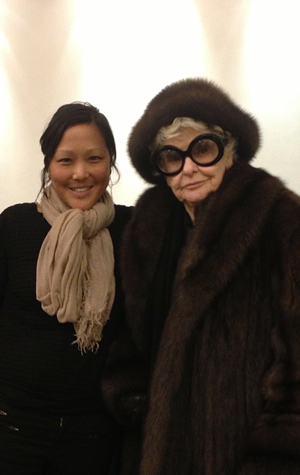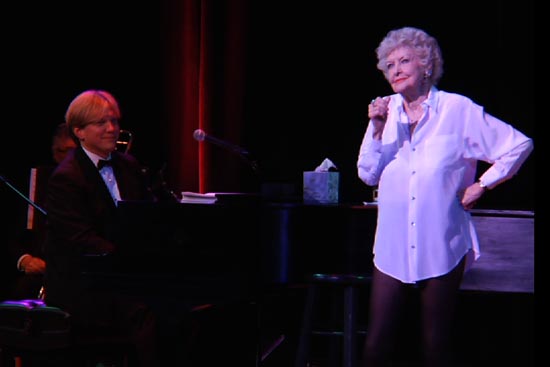COM Alum to Screen Film about a Broadway Legend
Documentary shows why Elaine Stritch was one of a kind

Tony- and Emmy-winning actress Elaine Stritch in a scene from Chiemi Karasawa’s documentary Elaine Stritch: Shoot Me, which will be shown tonight as part of COM’s Cinematheque series. Photo courtesy of Isotope Films
When actress Elaine Stritch died in July 2014 at age 89, she left behind a string of theater, television, and film credits that any performer would envy. Best known for her role as Alec Baldwin’s hilariously demanding and cantankerous mother on the TV comedy 30 Rock, Stritch was also a veteran stage actress who starred on Broadway in William Inge’s Bus Stop in 1955 and went on to rave reviews for her work in a string of musicals, including Noel Coward’s Sail Away, Stephen Sondheim’s Company (where she introduced one of the composer’s best known songs, “Ladies Who Lunch”), and later in revivals of Hammerstein and Kern’s Showboat and Sondheim’s A Little Night Music.
But Stritch’s greatest triumph was always playing herself. She won a Tony Award (and later an Emmy) at age 77 for her critically acclaimed one-woman show, Elaine Stritch: At Liberty, which recounted her personal and professional triumphs and tragedies.
A born raconteur with flawless timing, she proved an irresistible subject for filmmaker Chiemi Karasawa (COM’90), who spent 18 months following—and recording—her as Stritch completed a national tour of the show, rehearsed and performed a new show of Sondheim songs in New York, and prepared to move to Michigan to be closer to family.

Karasawa’s documentary, Elaine Stritch: Shoot Me, earned critical plaudits when it opened in 2014. Reviewing the film in the New York Times, critic Stephen Holden praised it for its “unflinchingly honest examination of a woman who is aware that the end is approaching.” Karasawa will screen her documentary tonight and answer questions as part of the Cinematheque series, a College of Communication program that brings accomplished filmmakers to campus to screen and discuss their work.
The filmmaker first met Stritch when she was working as a script supervisor on the set of John Turturro’s film Romance and Cigarettes in 2005. Stritch had been cast as James Gandolfini’s mother, and Karasawa says she was immediately taken with her energy and charisma. “It was like a tornado blew through town,” she recalls.
Several years later, Karasawa spotted Stritch at the hair salon they both frequented, and she began to think about directing a documentary about her. She asked her hairdresser if the woman in the salon was, in fact, Stritch. “Yes,” he said, adding, “You should be making a documentary about her!” The timing was propitious: Karasawa had recently launched her own production company, Isotope Films, and was looking for nonfiction material to produce.
At the time, she says, she had only a cursory knowledge of Stritch’s career, but she went home and googled the actress, downloading everything she could find. “I fell down the rabbit hole researching her,” the filmmaker says. What she discovered was “a woman with such singular talent, personality, and charisma” that she knew she’d be a compelling subject.
It took a bit of courting to convince Stritch to allow cameras to follow her around once their hairdresser had formally introduced them. The actress kept putting Karasawa off, saying, “We can start next month.” After four or five months of that, she finally relented, leaving a message on the filmmaker’s answering machine at 2 a.m. saying they could begin.
Elaine Stritch: Shoot Me is by turns hilarious and heartbreaking, offering an elegiac portrait of growing old and all the indignities that entails. The film includes several harrowing scenes in which Stritch, a longtime diabetic, confronts a series of medical crises, as well as others where the actress vents her frustration at no longer being able to recall the lyrics to songs she had performed for decades. In the film, she also spoke openly about her long battle with alcoholism and her decision, after 24 years of sobriety, to resume drinking (one cocktail a day).
The documentary also showcases Stritch’s acerbic wit. At one point, she encounters an old friend and exclaims, “Your hair looks good for a change.” In another scene, after being kept waiting on the set of 30 Rock for Baldwin to arrive, Stritch refers to him as “Alec Joan Crawford Baldwin.” The film includes plenty of dishy reminiscences, too, like the time the actress asked a young JFK to dinner (“because he was too attractive to leave behind”), but got dumped by him the next night when she wouldn’t put out.

Karasawa acknowledges that there were a few prickly moments during the beginning of shooting “before we understood each other’s rhythms and some after the edit was completed and she wasn’t exactly sure if she liked it.” But the COM alum says that at the end of the day, her subject “allowed me the freedom to create something about her without ultimately standing in the way.”
Elaine Stritch: Shoot Me represented a personal milestone for the filmmaker: it marked her directorial debut. Karasawa had intended only to produce the documentary, but Stritch didn’t want anyone else around and insisted she direct it herself. “She believed in me, and that was incredibly inspiring,” says Karasawa. “She had great confidence in people. It was infectious. She knew what it was like to be given an opportunity.”
What was Stritch’s reaction to the final film? Karasawa recalls that it was difficult for her at first. “She was terribly hard on herself. She said, ‘I love it, it’s well shot, it’s well edited, it’s entertaining, it’s engaging…I just don’t want to be in it!’ She initially thought it was sad.” But at subsequent screenings of the film, Karasawa says, Stritch was thrilled by the reception of audiences.
Filmmaker and actress remained close after work on the documentary ended, and Karasawa says Stritch influenced her in countless ways. “She was incredibly courageous and inspired people to have the same courage,” she says. “Elaine gave a very articulate voice in the film to the aging process. She allowed herself to be documented in a way that made the experience palpable, entertaining, poignant.”
Chiemi Karasawa (COM’90) speaks and screens her film Elaine Stritch: Shoot Me today, Friday, October 9, at 7 p.m. at COM Room 101, 640 Commonwealth Ave. The event, part of the BU Cinematheque series, is free and open to the public.
Comments & Discussion
Boston University moderates comments to facilitate an informed, substantive, civil conversation. Abusive, profane, self-promotional, misleading, incoherent or off-topic comments will be rejected. Moderators are staffed during regular business hours (EST) and can only accept comments written in English. Statistics or facts must include a citation or a link to the citation.